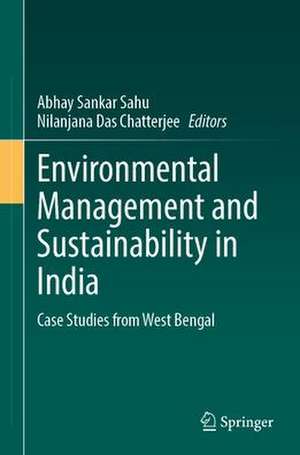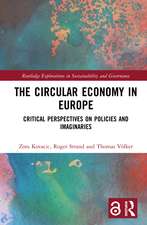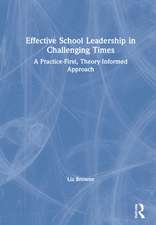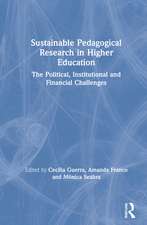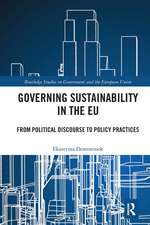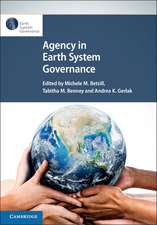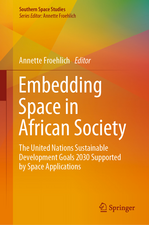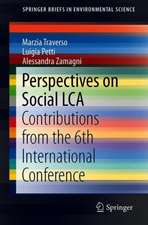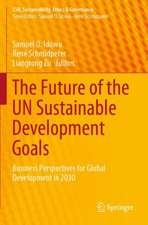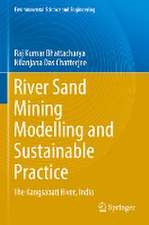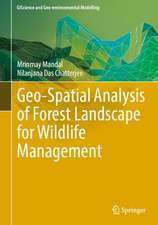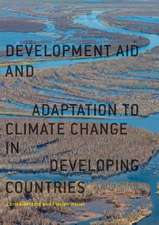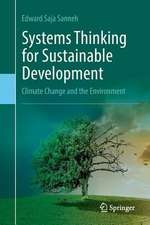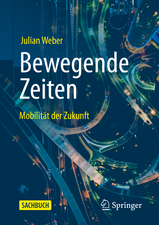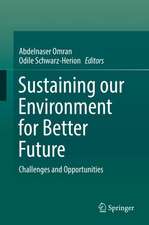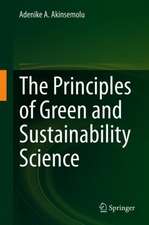Environmental Management and Sustainability in India: Case Studies from West Bengal
Editat de Abhay Sankar Sahu, Nilanjana Das Chatterjeeen Limba Engleză Hardback – 25 iul 2023
Preț: 1129.83 lei
Preț vechi: 1377.84 lei
-18% Nou
Puncte Express: 1695
Preț estimativ în valută:
216.22€ • 224.90$ • 178.50£
216.22€ • 224.90$ • 178.50£
Carte tipărită la comandă
Livrare economică 14-28 aprilie
Preluare comenzi: 021 569.72.76
Specificații
ISBN-13: 9783031313981
ISBN-10: 3031313984
Ilustrații: XIX, 605 p. 194 illus., 179 illus. in color.
Dimensiuni: 155 x 235 mm
Greutate: 1.05 kg
Ediția:1st ed. 2023
Editura: Springer International Publishing
Colecția Springer
Locul publicării:Cham, Switzerland
ISBN-10: 3031313984
Ilustrații: XIX, 605 p. 194 illus., 179 illus. in color.
Dimensiuni: 155 x 235 mm
Greutate: 1.05 kg
Ediția:1st ed. 2023
Editura: Springer International Publishing
Colecția Springer
Locul publicării:Cham, Switzerland
Cuprins
Part1. Introduction.- Chapter1. Environmental Sustainability: Status, Scope and Challenges in West Bengal.- Part2. Environmental Issues And Human Sustainability.- Chapter2. Forest Dependency and Rural Livelihood: Strategical Survival of People in Himalayan Foothills of Bengal Duars Region.- Chapter3. Identification of Potential Anthropogenic Barriers on Fluvial Connectivity in the Lower Gangetic Basin of India.- Chapter4. A Case Study of Channel shifting and its impacts on riverside Land Use and Land Cover Using RS and GIS in Teesta River in Jalpaiguri, West Bengal, India.- Chapter5. Monitoring shifting nature of river Singimari and its impact on riverside Land Use and Landcover in Dinhata-I and Sitai blocks of Cooch Behar district, West Bengal, India.- Chapter6. Societal Instabilities in the Wake of Shifting of River Course: A Study of Hotnagar Char of Bhagirathi River, West Bengal, India.- Chapter7. Strategic Infrastructural Development to Promote Sustainable Coastal Tourism through Geospatial Technology in PurbaMedinipur district, West Bengal.- Chapter8. A Study on the Characteristics of Sea Waves at Mandarmani Sea Beach of West Bengal.- Chapter9. Determining recent trends of forest cover loss and associated driving factors for sustainable management in the dry deciduous forest of West Bengal, India.- Chapter10. Impact of land Inundation Caused by Cyclone ‘Amphan’ across Bangladesh and India Using Spatial Damage Assessment Framework.- Chapter11. Developmental Project (Bandel Thermal Power Station) and Its Impact on Groundwater: An Empirical Study from Indian Perspective.- Chapter12. Spatio-Temporal Variation of Groundwater Table with Relation to Rainfall Distribution: A Study in Nadia District, West Bengal.- Chapter13. Identification of Groundwater Potential Zones (GWPZ) using Weighted Overlay Model: case study on a semi arid district of West Bengal, India.- Chapter14. Groundwater Irrigation and Consequent Hazards in East Barddhaman District, West Bengal, India.- Chapter15. Debates on Urban Environmental Issues and Trends of Urban Forestry in Kolkata Municipal Corporation: A Quantitative Approach.- Chapter16. Pandemic COVID-19, Reduced Usage of Public Transportation Systems and Urban Environmental Challenges: Few Evidences from India and West Bengal.- Chapter17. Estimating the variability of Ground level annual PM2.5 and PM10 using Landuse Regression Model in Kolkata Municipal Corporation (KMC).- Chapter18. Effects of land use and land cover on Surface Urban Heat Island (SUHI) in Durgapur-Asansol industrial region: A linear regression approach.- Chapter19. An Exercise on Valuation of Urban Heritage Site, A Comparative Study of Victoria Memorial Hall and Indian Museum, Kolkata.- Chapter20. Population shifting and its effect on women’s life: A case study at West Bengal, India.- Chapter21. Social Issues and Sustainability of COVID-19: A District Level Spatio-Temporal Analysis in West Bengal.- Part3. Ecosystem Restoration And Sustainable Development.- Chapter22. Dependence on Forest Products to Sustain Rural Livelihood: An Experience From Bankura Forest, West Bengal.- Chapter 23. Deterioration of Mangrove Forest Induced by Tropical Cyclone Amphan in Indian Sundarban: A Geospatial Analysis toward Sustainable Management[N1] Chapter23. Border netting technology with integrated pest management (IPM) strategies for sustainable chilli leaf curl management.- Chapter24. Smart Cities and Sustainable Urban Development in India: A Case Study of West Bengal.- Chapter25. Significance of Sustainable Transportation in Urban Mobility: A Special Study During Covid-19 Unlock Period in Kolkata.- Chapter26. Analyzing the urban land-use dynamics and associated impact on the ecological environment: a study in the selected part of eastern Kolkata for sustainable urban development.- Chapter27. Residents’ Perception Towards Environmental Impact of Municipal Solid Waste Disposal and Suitability Analysis for Landfill Site Selection using Geospatial Technique: A Case Study in Ranaghat Municipality, West Bengal.- Chapter 28. Yoga Tourism As An Emerging Branch of Eco-Tourism For The Restoration Of Sustainable Human Environment.- Chapter29. Formulation of geotourism development strategies for potential geoheritage sites in Subarnarekha-Kangsabati interfluve zone using tourist assessment value and SWOT-AHP hybrid model
[N1]According to the review report received from springer on 3rd Jan 2023 I am quoting the comment” Chapter 24/Haque et al.: This paper is essentially a mosaic of text taken from other sources, the main two being this paper and this paper. Neither of these papers are by the authors of the chapter. I would recommend cutting this chapter.” As per the suggestion we have excluded this paper from the book. So kindly remove it from the content.
Notă biografică
Dr. Nilanjana Das Chatterjee is Professor and former HOD in the Department of Geography, Vidyasagar University, West Bengal, India. She received her Ph.D. award from Burdwan University in 2009. She is an expert in the field of Bio-geography with special reference to human-elephant conflict in forest fringes and fragmented forest, Environment, Landscape ecology with special reference to urban ecology, Tribal Culture and Women’s studies. She has nearly 25 years of experience in research and teaching, and has authored more than 80 national and international research articles with high impact factor journals and received many prestigious awards. She is one of the twenty women scientists recognized by wildlife Institute of India, Dehradun. She is an enthusiastic IUCN Commission member of CEM. Six research scholars achieved their Ph.D. award and twelve students completed their M Phil degree under her supervision. She has completed a major project funded by ICSSR, New Delhi. Now she has completed a research programme funded by ICSSR on “Crime against Women West Bengal”. She has authored the book “Man Elephant Conflict: A case study from forests in West Bengal, India” published from Springer in 2016 and co-author of the book River Sand Mining Modelling and Sustainable Practice:The Kangsabati River, India, published from Springer Environmental Science and Engineering Series in 2021.Recently she has published another book on GIS Application for crime prediction: A spatio-temporal analysis for crime against women in West Bengal, India. Being a devoted teacher her passion is to maintain a good student teacher relationship.
Dr. Abhay Sankar Sahu is an Associate Professor and former HOD in the Department of Geography, University of Kalyani, Kalyani, West Bengal, India. He has also served as an Assistant Professor in the Department of Geography, Kashipur M.M. Mahavidyalaya, Purulia, West Bengal, India. He pursued his B.Sc. (Honours), M. Sc., and Ph. D. in Geography from The University of Burdwan, West Bengal, India. His Ph. D. thesis is on ‘Environmental Significance of Water-Front Embankments in South and Eastern Medinipur Coast’ and he has been awarded in the year of 2010. His research interest covers Environmental Geomorphology, Environmental Geography and Hazard Geography. He is continuously engaged in study and research works on river morphology, waterfront embankments, flood and waterlogging, riverbank erosion, coastal erosion, ecotourism, EIA and EMP, remote sensing and GIS, geographical bigdata and machine learning. He has nearly 20 years of experience in research and teaching, and has contributed more than 45 research papers published in different reputed national and international level journals and edited volumes. He has completed as a Principal Investigator of a project sponsored by the UGC, New Delhi, India, on ‘Toward an Exploration of an Embankment System in the Moyna Flood Basin’, and also completed as a Research Investigator of a project under the UGC-BSR start-up grant on ‘Environmental Consequences of Water-logging Problem in Purba Medinipur District, West Bengal: Evaluation, Mapping, and Management’. Presently he is working as a Principal Investigator of a project under the RUSA Component- 10 (Entrepreneurship and Career Hub), University of Kalyani, W.B., India, on ‘Understanding the problems of homestay tourism in the Mousuni Island of Sundarbans and entrepreneurship development’. He has successfully completed a lot of courses, training programmes and workshops on geospatial technologies, climate change, data analysis and machine learning in geoinformatics organized by the reputed governmental institutions like NATMO, Kolkata; NRSC (ISRO), Hyderabad; ICFRE, Dehradun; IIRS, Dehradun; NRDMS-DST, New Delhi; DSTBT, Kolkata; etc. At present, he is guiding as a supervisor a number of scholars towards their doctoral degree and already five research scholars achieved their Ph.D. award. He is a life member of more than ten different academic associations and institutions.
Textul de pe ultima copertă
This volume explores the spatial side of sustainability using cases from India. It provides a variety of chapters from scholars from West Bengal and elsewhere in the country, highlighting spatial perspectives on environmental issues and offering insight on sustainable development in the subcontinent from a geographical perspective. A wide variety of topics are covered here, including but not limited to mitigation of and adaptation to climate issues, hydrogeomorphologic issues, environmental management, agricultural sustainability, ecosystem services, urban environmental management and tourism issues. The lessons learned here are transferable to other contexts, and the book is a resource for researchers, academics, practitioners, government organizations, NGOs and anyone else interested in the spatial side of sustainability.
Caracteristici
Offers insights on a variety of topics related to sustainable environments in India
Highlights the spatial nature of environmental issues
Presents nature-based solutions to sustainable development and environmental restoration issues
Highlights the spatial nature of environmental issues
Presents nature-based solutions to sustainable development and environmental restoration issues
